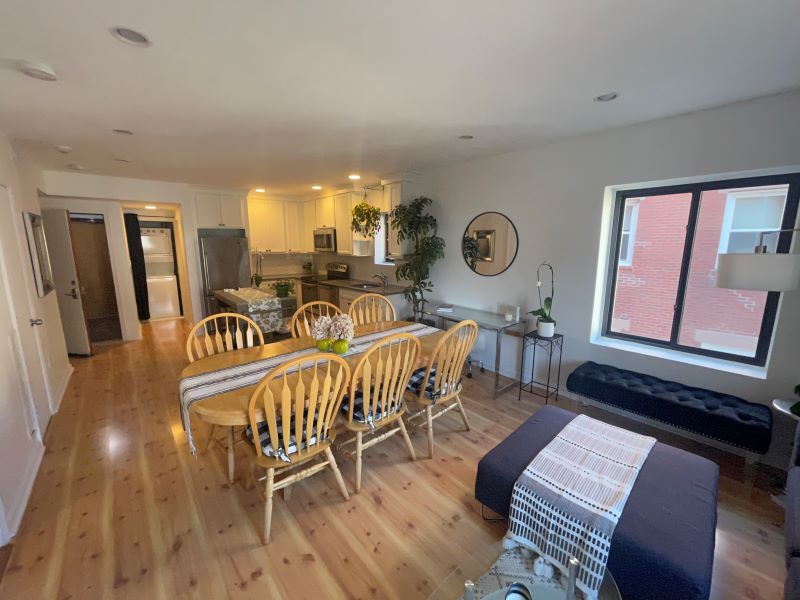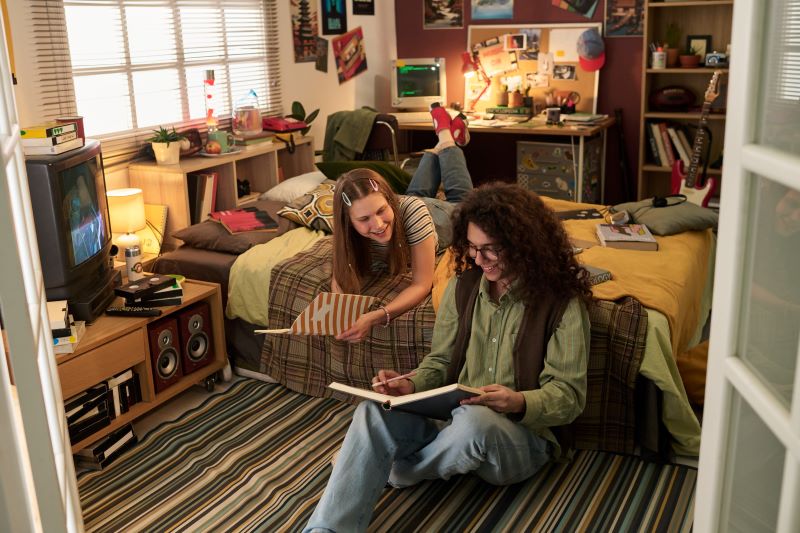
Deciding where to live as a college student in Boston is one of the most important choices you’ll make during your time in school. The options often boil down to the convenience and structure of dorm living versus the independence and flexibility of off-campus apartments. Both have their unique advantages, and what works best for you will depend on your priorities, budget, and lifestyle preferences. Understanding how factors like privacy, amenities, cost, and day-to-day living compare between these two options can go a long way in helping you make an informed decision that supports both your academic and personal goals. Boston off campus apartments can be particularly tricky as the housing stock and dorm pricing can vary greatly from school to school and area to area. This off campus housing article will seek to help you get focused and clarify some of the more complex issues so you can make the most empowering decision possible.

1. Privacy
Privacy is a major difference between dorm living and off-campus apartments. In dorms, even in upgraded options like apartment style dorms or single-room units, privacy is often very limited. You may be sharing a bedroom, a bathroom, and still have to check in to your building every time, while only being allowed a limited number of guests that also have to sign-in. Sharing a small bedroom can also be a real pain in neck if your roommate is a night owl and you are an early riser. Students living in dorms often complain about broken sleeping patterns due to sharing rooms.
Resident Advisors (RAs) also have access to your room for inspections, adding another layer of oversight. Off-campus apartments, by contrast, let you decide who you live with and who has access to your space. Almost all apartments in Boston usually have students enjoying their own bedroom space which is nice for untold amount of reasons. There is simply far more privacy and freedom when you rent an apartment in Boston vs. living in the dorms. Under Massachusetts tenant laws, landlords must give reasonable notice before entering, giving you full control of your personal environment.

2. Amenities & Policies
While dorms can, but often don't, offer some upgraded amenities like kitchenettes, central air, and living rooms, they often fall short of what off-campus apartments can provide. Apartments usually feature full kitchens, private bathrooms, and more spacious living areas. Not to mention the furniture, which you can't pick at a university dorm and is never truly comfortable or personal. You also get to decide how big a TV or couch you want. Many landlords will often provide gym equipment or other amenities within the building itself so that can go a long way in being more operationally efficient. Some of the better landlords in Boston provide mounted TV’s – I have personally witnessed and provided TV’s in the 80 plus in range. This type of immersive more home based feeling can bring a better overall experience and vibe to you daily living. Nothing beats having your school friends over for a big game or favorite TV series to watch while you whip up a fantastic meal for all to enjoy.
Some of the better off-campus buildings also come with added perks like parking, bike storage, and pet-friendly apartment policies. Plus, living off-campus often means easier access to nearby grocery stores, restaurants, and shops, which makes daily life more convenient. Being able to cook your own food also gives you the opportunity to purchase and eat more organic brands. Those those people that are concerned about what goes into their body – off campus living provides greater control of your diet and subsequent vibrant health..

3. Visitors
Dorm policies around visitors are typically restrictive. At many universities, overnight guests may require RA approval or be outright prohibited. This can make hosting friends or family incredibly challenging. In an off-campus apartment, you set your own rules about who can visit and stay over, giving you much more flexibility in managing your social life. If you decide to live with friends, you can all agree on your own set of rules that everyone is comfortable with. Living off campus also has a much larger and easier option of your friends and family finding parking. There are a lot of apartments in the Greater Boston area that have driveway parking. Nothing beats a great night on the town then getting up the next day to a car parked in the driveway and heading out for a great breakfast at a local diner.

4. Location
Dorms provide proximity to classes and campus facilities, which can be convenient for students. However, campuses are big and you may think you will be close to your classes but end up on the other side of a very large footprint. However, off-campus apartments often give you the freedom to choose a location that better fits your needs. We are also seeing a lot more students getting highly efficient scooters that often whisk them to school faster than ever before. E-bikes are also becoming much more common and what used to be a longer commute is now shrinking in time. Whether it’s reducing your commute to work, staying closer to family, or being near your favorite Boston neighborhood, off-campus living offers more flexibility. Apartments are also often surrounded by restaurants, grocery stores, and entertainment options, making them more convenient for everyday life. It is very important that you look at your overall commute from every angle.
View this post on Instagram
5. Cost
Cost is one of the biggest deciding factors in deciding to live on or off campus. Dorm living, especially in premium options, comes at an exceptionally steep price. At NEU, for example, a single bedroom in an Enhanced Rate Apartment costs about $2,444 per month, while a shared double is roughly $2,131 (~16 week Semesters are ~3.5 months). A shared double apartment at that price point seems super high to most people. If you have 3 people willing to pay even $2000 dollars per month you can literally live in some luxury buildings with your own room!
At BU, the price for an updated single-room in an apartment option is even higher at roughly $3,003 per month. By comparison, most off-campus apartments shared with roommates often range from $1,200 to $1,800 per person per month, depending on location and amenities- the real-time average rent price for a 3-bedroom apartment in Greater Boston has remained around $3,900/ month (about $1,300 per month per room). Additionally, dorms often close during summer and winter breaks, leaving students scrambling for short-term housing at high costs. Off-campus apartments, with their year-round leases, provide financial stability and eliminate the need to move multiple times a year.
The bottom line is that living in dorms in Boston is far more expensive than finding your own off campus apartment living. One of the keys to success is starting to look early and be ready to pounce on a great opportunity. Apartment hunting in Boston starts very early compared to other cities.

Conclusion
While dorms offer convenience and a sense of community, they often come with much higher costs, far less privacy, and significantly more restrictions. Off-campus apartments provide greater control over your living environment, better amenities, and more flexibility—all while often being more affordable. If you’re weighing your options, it’s worth exploring the benefits of off-campus living to see how it fits your lifestyle and budget. For the widest range of apartments in Boston for rent looking at bostonpads.com might just be your winning ticket to saving money and living larger than your friend stuck in dorms!

Demetrios Salpoglou
Published January 9, 2025
Demetrios has pulled together the largest apartment leasing team in the Greater Boston Area and is responsible for procuring more apartment rentals than anyone in New England – with over 130k people finding their housing through his services. Demetrios is an avid real estate developer, peak performance trainer, educator, guest lecturer and motivational speaker.










